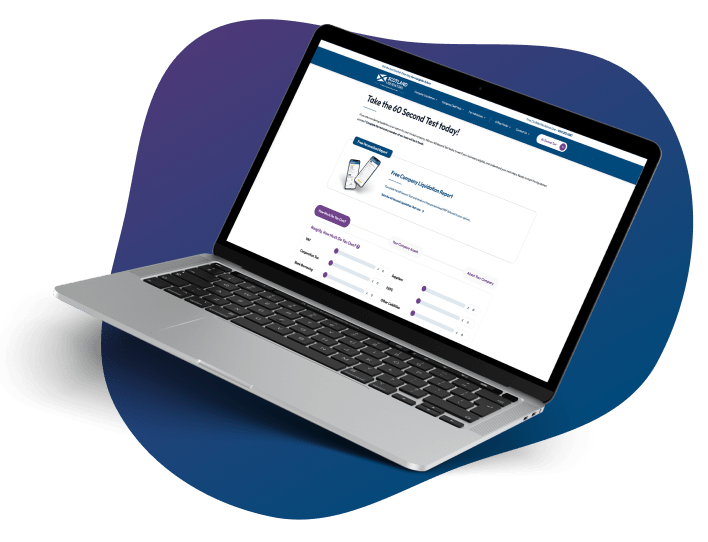Scotland Liquidators St Andrews
Our insolvency practitioners are highly experienced in advising limited company directors on business closure and company rescue. If you’re searching for advice on closing a limited company with debts or closing a solvent limited company, we can help. Contact our team that serve St Andrews for a free, confidential consultation or book a meeting at a Scotland Liquidators office near you.
If you’re under serious pressure as you cannot afford to pay creditors, including HMRC, you must seek urgent insolvency help to prevent worsening the financial position of creditors. If you continue trading while knowingly insolvent, this could be classed as director misconduct.
Suggested Pages:
Creditor’s Voluntary Liquidation in St Andrews
To close a business with debts, you must first settle outstanding affairs with creditors which may involve negotiating repayments – this can be facilitated by an insolvency practitioner through a Creditors’ Voluntary Liquidation (CVL). A CVL is a formal insolvency procedure that involves raising funds to repay creditors by realising company assets. Once creditors are paid to the fullest extent and any shortfall is written off, the company will be closed.
If you’re closing a solvent company with substantial retained profits, you may consider a Members’ Voluntary Liquidation (MVL). An MVL is a formal liquidation procedure that allows you to distribute funds tax efficiently. This will be subject to Capital Gains Tax, rather than Income Tax, and you may also qualify for Business Asset Disposal Relief, formerly Entrepreneurs’ Relief, which could further reduce your tax liability.
For more information on the company liquidation options available, try our free 60 second test. Simply enter how much you owe and company assets, and we’ll generate a personalised report on what procedures may be a suitable fit. Alternatively, get in touch with one of our insolvency practitioners that cover St Andrews for a confidential meeting to discuss the next steps.
Closing a Scottish limited company with HMRC debts
If your limited company is no longer financially viable and you have tax debts you cannot pay, closing it down can be an effective way to escape the financial pressure so you can move on to something new.
As soon as you become aware your company is insolvent, you should cease trading and seek professional advice from an Insolvency Practitioner. Your legal duties as a director now switch from promoting the success of the company to acting in the best interests of your creditors (parties you owe money to). By ceasing trading, it prevents the company from building up further debts it cannot pay that you could be made personally liable for.
Once you have ceased trading, you can voluntarily enter the company into a formal insolvency procedure called a Creditors’ Voluntary Liquidation (CVL). You must appoint an Insolvency Practitioner (IP) to act as the liquidator. They will take control of the company, invite claims from your creditors and sell off the company’s assets to raise money to repay HMRC and any other creditors.
The liquidator will repay your creditors in a strict order. As long as you have acted according to the insolvency rules, any debts the company cannot pay in full, including the company’s tax debts, will be written off. You’ll only have personal liability issues if you have signed a personal guarantee to secure company borrowing.
Why you need to act quickly with HMRC debts
Owing money to HMRC is not unusual. Most businesses in financial distress will have some form of tax debt. As the most common creditor in the UK, HMRC has strong powers of debt enforcement and will act quickly to recover its money and prevent you from accruing further tax liabilities you cannot pay.
It might be possible to negotiate a Time to Pay arrangement with HMRC, which will give you more time to pay what you owe. However, if your business is no longer financially viable, it’s in everyone’s best interests to close it down.
If you do not enter the company into liquidation voluntarily, HMRC can issue a Winding Up Petition to force the business into Compulsory Liquidation. As part of the process, the liquidator will investigate the reasons for the insolvency and the directors’ actions. That increases the likelihood that you will receive a penalty, such as being made personally liable for company debts or being handed a directorship ban.
Can I dissolve a company with tax debts in Scotland?
You might have heard of Company Dissolution or Strike Off as a way of closing your company. However, only solvent businesses can use this process. To dissolve your company, you would have to contact HMRC to settle your tax debts and repay all your other creditors in full. Only then could you apply to Companies House to strike your business off the official register.
If you try to dissolve a company without paying your tax debts, HMRC will formally object to your application. You could also face serious reprisals from the Insolvency Service, as it will be noted that you tried to use the strike-off process to avoid paying your debts.
Why close a company with HMRC debts via a Creditors’ Voluntary Liquidation?
If you want to close your limited company and have tax debts you cannot pay, you have two options. You can:
- put the company into liquidation voluntarily via a Creditors’ Voluntary Liquidation (CVL); or
- wait for HMRC or another creditor to force you into Compulsory Liquidation.
There are several benefits associated with taking control of the situation by initiating a CVL:
- You can decide when you enter liquidation and appoint your choice of liquidator.
- The liquidator will still scrutinise your conduct, but there’s less risk that director misconduct allegations will be made against you.
- If you have worked as an employee of the company for a minimum of 16 hours a week for at least two years, you could be eligible for company director redundancy pay.
If you’re unsure of your next steps or want to know more about how to close a limited company with HMRC debts, please contact the team at Scotland Liquidators. We offer free same-day consultations and provide expert guidance and support throughout the process.
I knew I needed to close my company but I wasn’t sure how to go about this with large debts that I was unable to repay. Scotland Liquidators clearly explained my options and held my hand throughout the entire process.
Catherine Muller | Director
I would highly recommend Scotland Liquidators to anyone considering closing their business. From the first phone call I knew where I stood and what my options were. I cannot thank them enough.
Jonathan Booth | Director
Scotland Liquidators helped me close my company last year after I made the tough decision to stop trading. My advisor was patient, knowledgeable, and supportive from start to finish. Many thanks.



